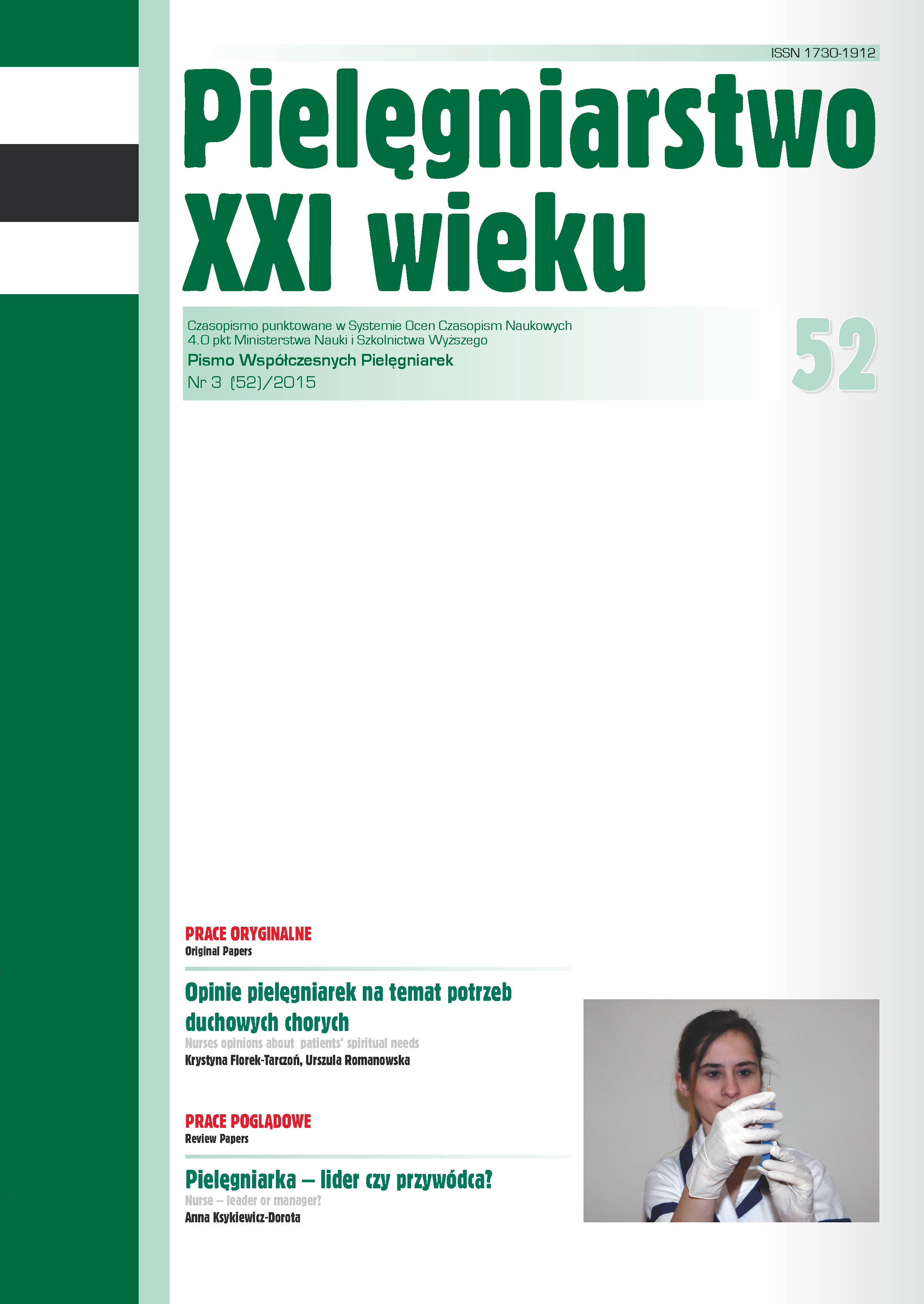Reflective practice in the professional development of working nurses
DOI:
https://doi.org/10.12923/p21w-2015-3/32Keywords:
reflective practice, nurses, professional developmentAbstract
REFLECTIVE PRACTICE IN THE PROFESSIONAL DEVELOPMENT OF WORKING NURSES
Introduction. Donald Schön claims that reflective practice is not only about dealing with difficult and untypical situations but also the development of one’s professional activity.
Aim of the Study. The aim of the study was to elicit the opinions of nurses about the concept of professional self-development and the possibility of using reflective practice for this purpose.
Material and methods. The diagnostic survey method was used, with the survey questionnaire developed by the authors. The surveyed group consisted of 136 (100%) nurses working in Lublin.
Results. The majority of study participants stated that reflection was an important part of their professional development (frequent – 44.90%, very frequent – 28.70%). Most nurses (85.29%) regard self-development as important. There was a relationship between caring for one’s development and education (p=0.030). There is also a correlation between the need for caring for one’s development and the opinion on occupational burnout (p=0.019).
Conclusions. (1) The majority of the nurses regarded the need to care for their professional development as important, and the nurses who applied reflection in practice perceived the need as more crucial. (2) The nurses with higher education more often claimed that one should definitely care for his/her development. (3) Nurses who assessed themselves as definitely not burned out understand that professional development is crucial.
References
1. Schön D. The Reflective Practicioner. How professionals think in action. Basic Books; 1983.
2. Benner P. From Novice to Expert. Addison-Wesley, C.A; 1984.
3. Cotton AH. Private thoughts in public spheres: issues in reflection and reflective practices in nursing. Journal of Advanced Nursing. 2001. 36 (4): 512-519.
4. Ruth-Sahd L. Reflective Practice: A Critical Analysis of Data-Based Studies and Implications for Nursing Education. Journal of Nursing Education. 2003. 42(11): 488-497.
5. Cooney A. Reflection demystified: answering some common questions. British Journal of Nursing. 1999. 8, (22): 1530-1534.
6. Seed J. Reflection on action: communication is the key. Journal of Perioperative Practice. 2006. 16, (12).
7. Clarke M. Action and reflection: practice and theory in nursing. Journal of Advanced Nursing. 1986. 11: 3-11.
8. Plack M, Santasier A. Reflective Pratice: A Model for Facilitating Critical Thinking Skills Within an Integrative Case Study Classroom Experience. Journal of Physical Therapy Education. 2004. 18, (1): 4-12.
9. Rolfe G. Beyond expertise: theory, practice and the reflexive practitioner. Journal of Clinical Nursing. 1997. 6: 93-97.
10. Gibbs, G. Learning by Doing: A guide to teaching and learning methods. Further Education Unit, Oxford Brookes University, Oxford, 1988.
11. http://www.cumbria.ac.uk/Public/LISS/Documents/skillsatcumbria/ReflectiveCycleGibbs.pdf (dostęp: 28.01.2015)
Downloads
Published
Issue
Section
License
Copyright (c) 2015 Tomasz Zdanowicz, Tomasz Cuber, Beata Dobrowolska (Autor)

This work is licensed under a Creative Commons Attribution-NonCommercial-NoDerivatives 3.0 Unported License.




